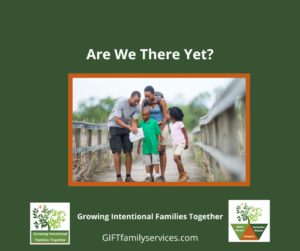 This familiar phrase plays out on nearly every family journey. It always seems to take longer to get to a desired destination. Children nearly burst with a need to vocalize their barely restrained anticipation. Parents might be less vocal. Yet often, they too are thrumming with excitement and a yearning to get there–wherever there is. A place. An event. A destination. A goal.
This familiar phrase plays out on nearly every family journey. It always seems to take longer to get to a desired destination. Children nearly burst with a need to vocalize their barely restrained anticipation. Parents might be less vocal. Yet often, they too are thrumming with excitement and a yearning to get there–wherever there is. A place. An event. A destination. A goal.
It is wise for adoptive families to have a heightened sense of awareness of ways they can support one another not only in getting there but also enjoying the journey as well as the destination. It can be useful to keep in mind several factors.
The purpose
Why choose to pursue this goal, visit this place, earn this skill, or engage in this activity? What will be the anticipated result?
Resources
Are the appropriate resources in place? If not, how will they be found? How will these resources be allocated? If time and resources will be disproportionately allocated, what impact will this have on the respective goals of other family members? How will it affect their feelings toward other family members?
How will it affect the family?
Is this something that will involve the entire family? If so, are they all equally committed? If not, what can be done to get others on board? How can the interests and needs of each family member be met? What are the various ways being supportive can take? How different can the degree of involvement of individual family members be?
How long?
Will this be a short-term goal that requires an intense full court press? All hands on deck or only a few? Or, will this goal demand a consistent yet less intense focus towards achieving a long-term goal? What rearranging of priorities might be necessary? If so, how will the family decide whose priorities get deferred and whose priorities come first?
Agency
Everyone yearns for and deserves a sense of agency in their lives. Adopted persons have a particularly strong need for control. It is wise and sensitive to look for ways to meet each person’s sense of agency whenever decisions are being made in the family.Of course, parents still serve as head of the family. Yet like all good leaders, they balance authority with sensitivity and an awareness of individual needs.
Trust
One of the primary goals of most–if not all–adoptive parents is to build a family who trusts one another. Trust is a foundational block of effective communication. Children will share their true thoughts, feelings and desires with their parents only if they feel they can trust them with the truth. They need to believe that parents are capable of hearing hard things without falling apart or blowing up. Trust makes honest communication possible.
Boundaries
In every aspect of life, boundaries serve as the guardrails that keep things from running over the cliff. It’s helpful to have clearly defined family boundaries. Post them in a place where they can be seen regularly. This can help cement them in everyone’s mind–parents and children. Some examples might be:
- We (parents and children) speak respectfully to and about each other
- We encourage one another
- We appreciate the interests of each family member
- We respect one another
- We tell the truth
- We apologize promptly and sincerely
- We strive to hear each other’s viewpoints
- We treat one another as we would like to be treated ourselves
Putting these ideas into practice
Our podcast and blog this month talked about vacations, so let’s think about the family on vacation. The ideal fantasy imagines everyone happy, enjoying themselves, getting along well, having enough time and money to do the planned activities–all without a hitch. So, basically…happy faces all around. Of course, fantasies come true only in our imaginations. So, let’s get more practical.
How can you stack the odds of having a successful family vacation?
- Gain consensus about where to go, what to do, and how long you’ll stay
- Acknowledge give and take
- Hear everybody out
- Make accommodations where you can
- Set achievable expectations
- Build in enough structure to keep things on an even keel
- Be realistic…things will go awry so roll with it
- Have a Plan B in mind
If this vacation includes birth parents, additional planning and consideration will help ensure that things go smoothly. Some things to think about:
- Will the child have some one-on-one time with their birth parent?
- What gestures of welcome can be extended?
- Define time boundaries
- When will activities begin and end?
- Who will participate?
- Balance Time Together with time alone
- Establish a signal for the child to indicate they need a break
- Establish a signal for the child to indicate they do not need a break
- Invite planning suggestions from the birth parent
Look back on your own family vacations. What made them memorable? What would you avoid doing again? What might you strive to include every time?
__________________________
-
- Call us at 1-800-653-9445
- Listen to our podcasts: Adoption Matters: Real People. Real Life. Real Talk and Essentials of Adoption Attuned Parenting
- Watch our YouTube channel
- Read Books written by our coaches
- Click to learn more about Adoption Attuned Certified coaching!
- Check out our on-demand courses.


